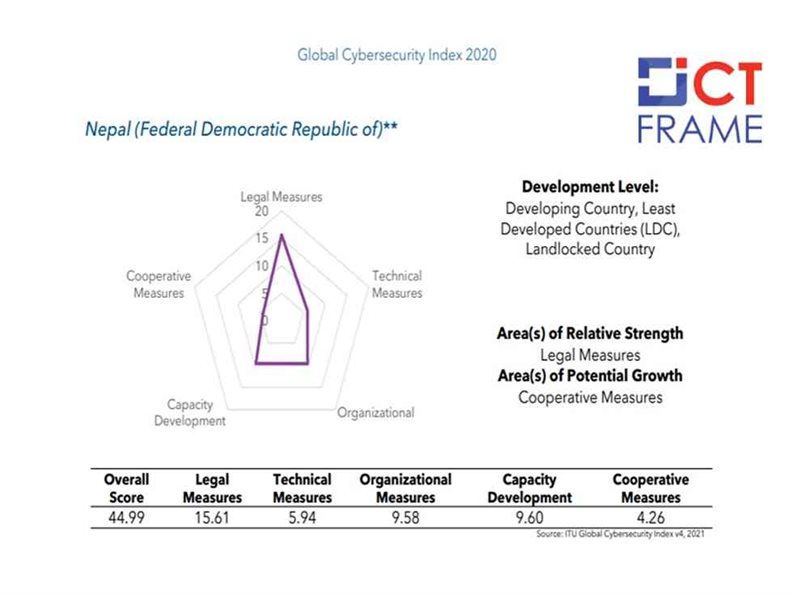Nepal Rises by 15 Positions in Cybersecurity
5th July 2021, Kathmandu
Nepal made improvements in the field of global cybersecurity. According to the Global Cyber Security Index released by the International Telecommunication Union (ITU) recently, Nepal has managed to climb 15 places in the cybersecurity rankings.
The Global Cybersecurity Index (GCI) was first started in 2015 by the International Telecommunication Union (ITU). To measure the commitment of 193 ITU Member States and the State of Palestine cybersecurity. And also to help them identify areas of improvement and encourage countries to take action through raising awareness on the state of cybersecurity worldwide.
According to the Global Cyber Security Index Report 2020, Nepal ranks 94th out of 194 countries in the study. Nepal was in 109th place in the 2018 Report.
Nepal has risen by 15 places in the last two years due to various policy reforms in cybersecurity and steps taken by the government for public awareness.
Report Shows
According to the report, Nepal has scored 44.99 points in various fields of global cybersecurity. The study was conducted based on five areas: the legal system, technical, organizational, capacity expansion, and corporation.
Nepal scored 15.61 points in terms of the legal system. It shows the most improvement in the legal system in the last two years. It got 9.60 points in capacity expansion, 9.58 points in organizational criteria, and 5.94 points in technical criteria.
Nepal is weak in terms of cooperation required for cybersecurity, according to the report. Nepal scored only 4.26 points.
In this process, Nepal has also advanced in Asian countries. Out of the 36 Asian countries participating in the study, Nepal is ranked 17th and is among the top 20 countries.
Should Nepal be concerned?
However, Nepal looks very weak compared to the neighboring countries. According to the report, India ranks 10th in the world in the Cyber Security Index. Another neighbor, China, is ranked 33rd. Nepal lags behind many other countries in terms of South Asian countries.
Only Afghanistan and Bhutan are after Nepal, and India, Bangladesh, Pakistan, and Sri Lanka are ahead of Nepal.
The United States tops this year’s Global Cyber Security Report. The United Kingdom and Saudi Arabia are in second place with the same number of points. Estonia is in third.
A questionnaire was prepared for each of the five regions to prepare this report according to the association. One representative was appointed from each country.
The report has been prepared based on the information collected from it and certified documents and discussions with experts. Half of the participating countries formed the National Computer Incident Response Team (SERT) during the study.
So, What’s Next?
Nowadays, in the context of easy Internet access, especially online and mobile businesses. Sensitive transactions take place online because of which cybersecurity incidents are increasing day by day. According to the research, Nepal is the top target country in “cyber threat.”
Cybersecurity policies draft has listed out few points to improve the rank in the Global Cybersecurity Index.
- Need for Security features such as confidentiality, integrity, availability, and authenticity. There is also a need for non-repudiation.
- Ethical hacking needs to be given legal recognition to secure the technology.
- Data Resources Insurance for the type of data leakage regarding insurance should be mentioned in the policy.
- If there is a cyber-attack on any organization and if there is any security vulnerability in that organization. It should be mentioned in the policy to take action against the organization.
- As mentioned in the policy, cybersecurity is not just about being a center. It includes a security operations center that can do threat intelligence monitoring, or if someone detects a threat, where to report such threats needs to be mentioned.
- The proposed cybersecurity policy omits the security of cloud services. It is important to make policy arrangements for the security of cloud services provided by the National and international services.
In this way, Nepal can increase the legal system by more than 15.61 percent. With a better legal system, Nepal will get more than 15 places in the upcoming years too.
Author :Krishna Prasad Bhattarai







